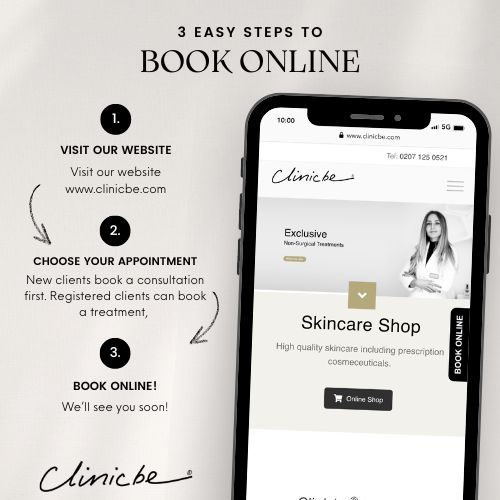Acne is defined as a long-term skin condition characterised by areas of blackheads, whiteheads, pimples, greasy skin and possibly scarring.
It is the most common skin condition, affecting 80% of people at some point in their lives. It usually starts in the teens and goes on into the 20’s, although it can be much longer, continuing well into adulthood for some people.
There are 3 levels of severity:
- Mild acne consists of a few lesions that are close to the surface, and not deep or inflamed
- Moderate acne is marked by deeper nodular lesions and some redness
- Severe acne involves many lesions, multiple cysts, and a great deal of redness and inflammation
ClinicbeAcne
In Dr Barbara Kubicka has established ClinicbeAcne, as a dedicated service, specifically for patients with acne and acne-related conditions (scarring and pigmentation).
The clinic is registered to help patients from the age of 13 and practises a holistic approach to treatment. The clinic offers a unique insight into the body’s imbalances through Oligoscan cellular testing. This enables the doctor to create the most appropriate treatment plan, which could include:
- Professional skin treatments in clinic
- Skin regimes using advanced and pharmaceutical-quality skincare products
- Nutritional advice to address imbalances
- Prescription medication
Understanding Acne
Acne is caused by bacteria that lives in the skin called P. acnes. P.acnes grow predominantly in sebaceous glands, which produce oil called sebum.
It can be highly distressing, causing redness, pustules, blisters and spots which can appear as quite a large rash.
It is very important to treat severe acne in order to avoid scarring in the future.
Traditional acne treatments work by cleaning the skin and clearing away excess sebum to help reduce the growth of the bacteria. In severe cases, antibiotics can be used to help to kill the bacteria, although over-use and inappropriate use of antibiotics is discouraged as bacteria can become resistant in the long term. In addition, there may be side effects.
Acne Treatment Options
Clinicbe offer a unique approach to treating acne. Rather than rely on medications with potentially unpleasant side-effects, Dr Barbara Kubicka’s unique treatment is based on the principle of working on the skin inside and out combining top dermatological treatments.
Treatments To Kill Bacteria and Promote Healing
- Plasma Shower treatment applies plasma energy to the skin which destroys bacteria on the skin and within pores. This sterilisation can stop flareups and inflammations caused by overactivity within the skin. Plasma energy also triggers healing processes for rapid improvement in cysts and redness, promoting skin regeneration for healthier and clearer looking skin
- IPL or Intense Pulsed Light treatment can help to improve both acne and acne scarring. The treatment works beneath the skin, targeting the sebaceous glands with specially chosen light waves in order to kill bacteria. In addition, it tackles overactive sebaceous glands, which decreases the overproduction of oil that leads to acne. It can calm inflammation and reduce enlarged pores and redness
Exfoliation
- Chemical peels and microdermabrasion are designed to powerfully exfoliate the skin, sloughing away dead skin cells and providing a deep clean for pores, eliminating the acne-causing bacteria.
- Exfoliation is very important for managing acne, in order to keep the skin super-clean and avoid any build-up of dead skin cells where bacteria can breed.
- These treatments have an added, longer term benefit too. When the dead skin cells are removed, revealing fresh new skin beneath, the body’s own regeneration processes also kick into action, producing new skin cells. This makes skin healthier and gives a glowing radiance.
Medical Facials
- ClinicbeAcne offers medical facials ideally designed for the needs of patients with acne
- The clinic has access to a range of specialist products and ranges
- Acne facials may be used as a one-off treatment to help bring down flare-ups, but greater benefit often comes when a facial is carried out as part of a comprehensive acne treatment plan. This may mean a sequence of facials, combining it with other treatments or using a professional facial alongside an appropriate at-home regime.
Stimulating Recovery
- Micro-needling is a technique which involves delivering hundreds and hundreds of tiny injuries on the surface of the skin. This process stimulates the skin to respond with natural healing, producing healthy new skin cells.
- Options include Dermapen, the small device which offers the most precise delivery of microneedling. We have also developed an exclusive Dermapen with TCA peel combination treatment for acne sufferers
- As well as killing acne bacteria and calming inflammation, IPL can also stimulate healing, regeneration and new collagen production for healthier, firmer skin
Acne and Hormones
Acne can be associated with hormonal changes or surges, which can trigger flare-ups which could last for months or years. Consultations with Dr Kubicka also include a review of any medical or hormonal conditions together with advice on appropriate treatment.







